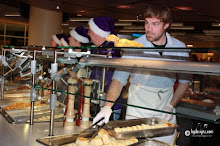I was so excited to get started meeting my Muslim neighbors that I drove to the American Muslim Society in Coldwater, Michigan (about 15 miles away). I also decided to read the first Surah in the Quran, which is short, but very important (it's recited many times a day in daily prayer). Getting a head start was probably smart considering the next few Surah of the Quran are very lengthy.
When I arrived at the American Muslim Society, I struck up conversation with a young man named Hussein. I introduced myself and said that I was interested in connecting with the community there and learning more about it. The Muslim community there has its own Islamic school, grocery store, and Masjid. Hussein said that most of the families are orignially from Yemen. I asked how many people are active in the Mosque. He said that I just missed Friday prayer at noon where there were over 300 people in attendance.
Wow. 300 people! That's more than 3 times the regular attendance of my wife's church in the area. Especially in a town of around 12,000 people, that size of a Muslim community is astounding...and telling of our increasingly diverse religious landscape in America.
Hussein's father, Ali, introduced himself and gave me the contact information of the manager of the Mosque named Musa. Musa knows best the history of the community and could help me with my project of reading the Quran. I also asked if it would be ok to join them for Friday prayer in the following weeks and they said I was always welcome and to come anytime. I thanked them both and told them I looked forward to seeing them again.
Even though it was a spur of the moment visit, it turned out to be extremely worthwhile. I felt very welcomed by the community, even though I'm sure they wondered why this strange Christian arrived unannounced and asked so many questions. While I was there, Islamic school was in session and about 10 kids were outside playing and walking down the streets. Some of the women or girls wore hijabs and it seemed like only the older women wore burqas which covered their whole body. I didn't get a chance to talk to any women, but I was aware that the cultural customs may be sensitive, especially of an outsider, talking to women of the community. That's something I can ask Musa in the future.
Then I drove home and opened the Quran. The first Surah reads as follows...
Surah #1: Al-Fatiha (The Opener)
In the name of Allah the most beneficent the most merciful
All praise is due to Allah
The most benificent the most merciful
The lord of the day of Judgement
Thee alone we worship thee alone we seek for help
Guide us to the right path
The path of those upon whom thou has bestowed favors. Not of those who thou has cursed once not of those whom have gone astray.
While I know this Surah is very important and is recited many times (anywhere from 17-49 times, I have read, each time to complete a Raka'ah) in the daily prayer life of a Muslim, I would love to hear more information about the first Surah from my Muslim friends reading this blog (Ala, Hamza, Zair, Hithem, Sidra, Reem...I'm counting on you!).
When I read this 7 verse Surah, I couldn't help to be reminded of the Jewish Shema (Hear, O Israel: the Lord is our God, the Lord is One) or the Christian Great Commandment or Lord's Prayer. I just had a sense, in these short verses of the Surah, so much meaning and faith and love and devotion is contained. I wonder if this Surah serves as a foundation of one's religious life as a Muslim and connects the individual with the community and with God, due to its powerful words and common, daily usage. I know the Lord's prayer does that for the Christian world.
And further, I found the language, the attributes of Allah, and the petitions to be very familiar coming from a Christian perspective. The beliefs expressed in this first Surah are shared with the Judeo-Christian community. While I know there are very distinct differences among the Abrahamic faiths, which is good and beautiful, I find this Surah could and should be a point where we can come together, acknowledging we share much (possibly more than we differ) as Jews, Christians, and Muslims. We share the worship of one God (Yes. Even though we, Christians, believe that Jesus is God, the doctrine of the Trinity affirms our monotheism. Speaking of which, this was one of the most common questions I recieved from Muslims during my interfaith dialogue presentations--How can Christians be monotheists if they believe in God and Jesus as divine?) We share the devotion to this God and the hopes that our God will guide us down the right path in this difficult life. We share the hopes that our God is just and that there will be some benefit to trying to lead a good life, even if it is just knowing that God is always with us. We share the belief that our God is merciful and will love us even in our darkest moments.
Again, I celebrate our differences and do not wish to diminish them...but we share so much in beliefs and tradition as Jews, Christians, and Muslims. Hopefully, soon, we will be able to share more in each others' lives.
Posted via email from Advent with Islam: A Presbyterian Chaplain's Journey with the Quran











